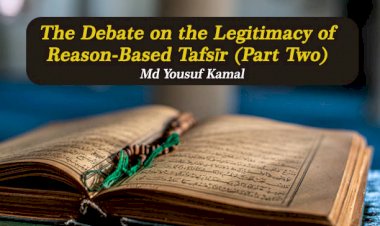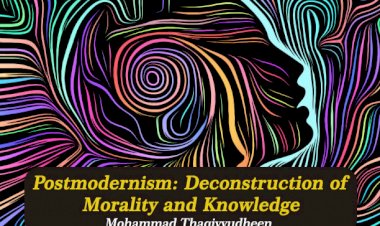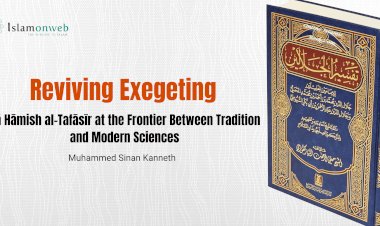﴾إِنَّ رَبِّي لَطِيفٌ لِّمَا يَشَاءُ﴿ | Walk the Way, He Has Plans for You
In a world that often demands clarity, quick fixes, and visible progress, the Divine narrative invites us into a space of quiet trust and subtle unfolding. The Qur’anic lens doesn’t rush outcomes—it teaches us to walk with certainty even when the road disappears beneath our feet. Today’s reflection centres on one of the most profound acknowledgements of divine orchestration, spoken by Prophet Yūsuf عليه السلام at the closing chapter of a life shaped by veiled mercy: {إِنَّ رَبِّي لَطِيفٌ لِّمَا يَشَاءُ} — "Indeed, my Lord is Subtle in what He wills." [Sūrat Yūsuf 12:100]
This verse — {إِنَّ رَبِّي لَطِيفٌ لِّمَا يَشَاءُ} — did not emerge from a moment of ease or comfort. It was not said while resting in peace, free from hardship, or amidst the applause of worldly success. Rather, it was uttered at the end of a long and winding road—a road paved with pain, betrayal, isolation, and tests upon tests, all strung together by divine precision.
The Story Behind
It all began with the innocent dream of a young boy who saw the stars, the sun, and the moon bowing down to him. A dream that held within it a divine promise, but whose path to fulfilment would be anything but easy. The journey first led him to the depths of a well, cast away by his own brothers. What heartbreak could be deeper than being betrayed by those closest to you? Yet even in that darkness, the subtle plan of Allah was unfolding.
From the well, he was pulled out—not to be returned to his father’s embrace, but sold as a slave in the markets of Egypt. Stripped of freedom and dignity, the noble son of a prophet became a mere commodity. But Allah was still crafting the story.
In the house of the Egyptian minister, he faced another trial—not of chains, but of desire and temptation. He resisted not only out of fear, but from a deep-rooted knowledge of his Lord: {قَالَ مَعَاذَ اللَّهِ}. His refusal led not to reward, but to prison—another descent that, to the onlooker, seemed unjust. But again, this was no detour—this was divine design. In the prison, Yūsuf’s wisdom and integrity shone, laying the groundwork for his future elevation.
Years passed. Forgotten by the world, yet remembered by the Lord of the worlds, Yūsuf عليه السلام was finally called upon to interpret the king’s dream. And from that prison cell, he emerged not just as a freed man, but as the treasurer of Egypt—entrusted with its economy during crisis, with a heart still rooted in faith and humility.
Then came the most emotional chapters—reunion with his brothers, the realization of the dream, and the tearful return of his father’s sight. All of this, after a lifetime of hardship.
So when Yūsuf عليه السلام finally stood with his family, every broken piece now in place, every wound now healed with meaning, he said with full conviction: {إِنَّ رَبِّي لَطِيفٌ لِّمَا يَشَاءُ} — “Indeed, my Lord is Subtle in what He wills.”
The Qur’ān encapsulates this pathway in remarkably concise yet powerful words.
)وَرَفَعَ أَبَوَيْهِ عَلَى الْعَرْشِ وَخَرُّوا لَهُ سُجَّدًا ۖ وَقَالَ يَا أَبَتِ هَٰذَا تَأْوِيلُ رُؤْيَايَ مِنْ قَبْلُ قَدْ جَعَلَهَا رَبِّي حَقًّا ۖ وَقَدْ أَحْسَنَ بِي إِذْ أَخْرَجَنِي مِنَ السِّجْنِ وَجَاءَ بِكُمْ مِنَ الْبَدْوِ مِنْ بَعْدِ أَنْ نَزَغَ الشَّيْطَانُ بَيْنِي وَبَيْنَ إِخْوَتِي ۚ إِنَّ رَبِّي لَطِيفٌ لِمَا يَشَاءُ ۚ إِنَّهُ هُوَ الْعَلِيمُ الْحَكِيمُ ( سورة يوسف – 100
“And he raised his parents upon the throne, and they fell down before him in prostration. And he said, ‘O my father, this is the interpretation of my dream of before. My Lord has made it a reality. And He was certainly good to me when He took me out of prison and brought you here from the desert after Satan had stirred up discord between me and my brothers. Indeed, my Lord is Subtle in what He wills. Truly, He is the All-Knowing, the All-Wise.’” [Sūrat Yūsuf 12:100]
This verse marks the triumphant culmination of Yūsuf’s عليه السلام journey—from a boy with a dream to a man whose vision is fulfilled with divine precision. After decades of separation, betrayal, imprisonment, and tests, he stands with grace, not gloating but grateful, recognising Allah’s لطف (latīf)—His subtle, gentle, and wise planning that was always at work behind every twist in his story.
“Indeed, my Lord is Subtle in what He wills..."
What seemed like a pitfall was in fact a pathway. What looked like loss was simply setting the stage for greater gain. What felt like being forgotten was actually a divine pause before a purposeful rise. His life teaches us a timeless lesson: When you cannot trace the plan, trust the Planner.
Do you know how many years it took for the dream of Yūsuf عليه السلام to come true?
According to Imam Fakhr al-Dīn al-Rāzī, there is no doubt that Prophet Yūsuf عليه السلام saw his dream during childhood, though the exact age is a matter of narration. Wahb ibn Munabbih narrates that Yūsuf عليه السلام first saw a vision at the age of seven, where eleven long sticks were fixed into the ground in a circle, and a smaller stick leaped upon them and swallowed them. When he shared this with his father, Yaʿqūb عليه السلام warned him not to speak of it to his brothers. Later, at the age of twelve, Yūsuf saw the sun, moon, and eleven stars prostrating before him—the dream mentioned in the Qur’ān. Again, his father advised him to keep it hidden, fearing their envy.
It is said that between the time Yūsuf saw this dream and the moment his brothers came to him in Egypt, forty years—or according to some, even eighty—had passed.
This lengthy span between vision and fulfilment is not incidental. The scholars mention a pearl of wisdom in the way divine plans unfold: ominous dreams or difficult fates manifest quickly, out of mercy—so the sorrow is not prolonged by anticipation. But glad tidings often take time, so that the joy of hopeful expectation may extend and mature the heart. Good things—like the dream of Yūsuf—are not rushed. Their beauty lies in the process, in the slow but certain unfolding of divine wisdom.
Yūsuf’s life is a living example of this divine subtlety. His story was not one of quick resolutions or instant triumphs. Instead, it teaches us the art of walking the long road with hope, of trusting Allah even when the meaning is hidden. The journey from the dream to the throne took decades—but through every twist and turn, Allah was preparing something greater than what anyone could see. It was not just about reaching the goal—but about shaping the soul along the way.
And so, at the very end, Yūsuf عليه السلام declares with deep conviction and clarity:
{إِنَّ رَبِّي لَطِيفٌ لِمَا يَشَاءُ}
"Indeed, my Lord is Subtle in what He wills."
It is a statement that only someone who has lived through the quiet craftsmanship of divine mercy could say. Every word carries a world of meaning, reflecting the depth of divine wisdom and the subtle unfolding of Allah’s plan. Indeed, "My Lord is Subtle in what He wills" is a timeless reminder: He orchestrates every delay, every detour, and every difficulty with precision, purpose, and mercy.
Al-Laṭīf – The Subtle
The name Al-Laṭīf encompasses more than mere gentleness. As Imām al-Ghazālī explains, Al-Laṭīf is the One who knows the subtlest benefits and deepest secrets, and delivers them in the most tender and hidden ways. It is not only about hidden knowledge, but also about gentle action—bringing about good without harshness, and through paths we often do not perceive.
Al-Khaṭṭābī described Al-Laṭīf as the One who grants His servants goodness from avenues they cannot expect, orchestrating circumstances quietly, without force or spectacle. Likewise, Al-Zajjāj affirmed that Al-Laṭīf acts in secrecy, granting favour without the servant knowing its source.
So, when Yūsuf عليه السلام stood at the height of his story and said, {إِنَّ رَبِّي لَطِيفٌ لِّمَا يَشَاءُ}, it was the voice of someone who had seen divine wisdom unfold through betrayal, imprisonment, and reunion. Every stage—hidden, painful, or confusing—was a moment of divine subtlety.
Al-Laṭīf is He who plans for you while you're unaware, rescues you when you feel forgotten, and brings you full circle when you thought the circle had shattered.
Allah’s lutf (gentle kindness) flows through every detail of our existence — seen and unseen, welcomed or withheld. As Ibn al-Qayyim رحمه الله masterfully wrote in his Nūniyyah:
“He is al-Laṭīf with His servant, for His servant,
And His gentleness manifests in two great forms:
A knowledge that perceives all hidden matters,
And kindness precisely at the point of relief.
He shows you His might, and unfolds His lutf,
While the servant remains heedless of what unfolds.”
This lutf of Allah is twofold:
- Through His perfect knowledge, He sees what we cannot see — the secrets of our hearts, the traps of the path, the weight of our burdens.
- Through His subtle actions, He brings about relief, sustenance, protection, and elevation, often in ways we never expected, and at moments we never predicted.
Allah says: {اللَّهُ لَطِيفٌ بِعِبَادِهِ} – "Allah is Gentle with His servants" (Ash-Shūrā: 19). His general lutf reaches all His creation — believer or not. He provides, protects, and heals, even to those who deny Him. But His special lutf is reserved for the believers. To them, He decrees only what ultimately benefits them — even if they dislike it — because He knows what they don’t.
When they receive blessings, He grants them gratitude to elevate them further. And when trials descend, He envelops them in patience and acceptance, rewarding them in ways beyond measure. That is the beauty of the Divine Subtlety — it quietly transforms what seems bitter into sweetness, and what seems like a fall into a rise.
The subtlety of Allah’s plan is always at work, though often veiled from the impatient heart. As ibn ʿAṭāʾ Allāh al-Iskandarī said, “Allah’s kindness surrounds us from every direction, but some hearts are blind and can only see the affliction. Allah’s kindness is never separate from His decree. Whoever imagines that His kindness could be detached from His qadar has only done so due to shortsightedness.” The path may seem steep, and the trial may feel unrelenting, but beneath it all is divine gentleness, quietly arranging outcomes beyond our perception.
Imām al-Ghazālī reminds us, “Whoever recognises the hidden kindness of Allah is content with His actions in all circumstances,” and he further advised: “Know that anyone who does not believe in Allah’s kindness the way a patient believes in a skilled and compassionate physician, has not truly relied upon Him.”
Dr. Muhammad Saʿīd Ramaḍān al-Būṭī in his exegesis on al-Ḥikam al-ʿAṭāʾiyyah, explains that many people mistakenly believe Allah’s lutf (subtle kindness) is absent during trials and hardships. In reality, His divine decree (qadar) is always intertwined with lutf, but the subtlety lies in how this mercy is delivered. At times, the path to benefit and protection must pass through experiences that seem painful or harsh. Just as waking a heedless person may require startling him into awareness, divine care may appear—on the surface—like harm, though it’s truly safeguarding and reforming.
Al-Būṭī stresses that the measure of divine acts lies in their outcome, not in their apparent form. The more hidden the mercy is, the deeper the lutf. What may appear as a setback—like a failed marriage, lost job, or illness—is in fact an instrument of divine gentleness, shielding us from harm or directing us to a greater good.
Allah may take away wealth, health, or comfort, not out of wrath, but to heal unseen spiritual ailments or to redirect a person to something better than what they had hoped for. The real good lies in the result, not in our initial perception. What seems bitter often carries hidden blessings, only visible with time and reflection.
He concludes by highlighting two tools to bear such divine turns:
Firm trust in Allah’s wisdom, mercy, and subtlety.
Reflecting on past trials—how each hardship ultimately led to protection or greater blessings.
Thus, the believer should not judge matters by the pain of the moment, but by the eventual wisdom and mercy behind it—and that is the very essence of {إِنَّ رَبِّي لَطِيفٌ لِمَا يَشَاءُ}.
We live in the ‘now’, limited to the moment we are in — but Allah is beyond the bounds of time. He sees the entire journey, from beginning to end, and orchestrates everything with wisdom that spans lifetimes. What you perceive as a delay or a detour may, in His sight, be the perfect step toward a better destination.
Trust the One who sees the whole, even when you only see the fragment. His lutf is always there, even when His wisdom withholds the explanation.
Disclaimer
The views expressed in this article are the author’s own and do not necessarily mirror Islamonweb’s editorial stance.
























Leave A Comment